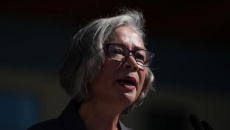The British Columbia government and social media giants have made what they call a "historic collaboration" for youth safety online.
A joint statement from Premier David Eby and representatives of Meta, Google, TikTok, X and Snap Inc., the parent of Snapchat, says they met to help young people stay safe online, one of the most important challenges facing families, government and companies.
At its first meeting earlier this month, the group says they discussed broad-scale co-operation because online predators like those who have targeted children in B.C. don't limit themselves to just one platform.
The companies have committed to providing B.C. with so-called direct escalation channels that will allow for quick reporting of non-consensual intimate images being placed online even before a protection order is issued.
The statement says that will make it easier for those in B.C. to get the images taken down quickly, demonstrating the platforms' commitment to protecting privacy online and "promoting responsible digital behaviour."
The meeting comes after the B.C. government put its online harms legislation on hold last month because it reached an agreement with the companies to talk about solutions for protecting people's safety and privacy online.
"Recognizing the shared goal of teens having safe, age-appropriate experiences online, action-table participants agreed that future meetings would continue to emphasize new actions to promote youth safety online," the statement says.
Also under discussion at the table was how the companies can help amplify official information for people in emergency situations like wildfires.
"Meta has agreed to establish a direct line of communication that will ensure response measures are closely co-ordinated as part of the government's wildfire safety efforts, including the dissemination of reputable information available from official sources, such as government agencies and emergency services," it says.
The change comes after Meta cut off news feeds on its Facebook and Instagram platforms last year over the federal government's creation of the Online News Act, to have social media companies pay outlets for the news stories that are repeated on their channels.
Prime Minister Justin Trudeau criticized Meta last week, saying it was making billions off people, but taking no responsibility for the well-being of the very communities they profit from by cutting off news feeds.
There's no indication in the latest statement that Meta has changed its position to allow news to be published on its sites, but the statement says Meta, Snap, TikTok and X have offered to provide B.C. and crisis-response organizations with advertising support to amplify awareness of safety resources in the wildfire season.
"The table is committed to continued engagement leading to further concrete actions to be announced in September," the statement concludes.
Eby said during the announcement of the original online harms legislation in March that one of its key drivers was the death of Carson Cleland, a 12-year-old Prince George, B.C., boy who died by suicide last October after falling victim to online sextortion.
Ryan Cleland, Carson's father, said last month that he had "faith" in Eby and the decision to suspend the legislation.






